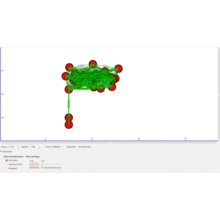Tag Archive: 'ns3 projects'
In a mobile ad hoc network (MANET), communication between mobile nodes occurs without centralized control. In this environment the mobility of a node is unpredictable; this is considered as a characteristic of wireless networks. Because of faulty or malicious nodes, the network is vulnerable to routing misbehavior. The resource constrained characteristics of MANETs leads to increased query […]
The paper presents the results of simulation verification of trust-based protection mechanism (TUBE) to attacks on a reputation systems. The authors give a short description of TUBE scheme and present a review of typical reputation attacks. The TUBE scheme supports the MANET nodes operations allowing assessment of the nodes surrounding and use of this information to increase […]
A Mobile Ad-hoc Network (MANET) is a constantly self-configuring, infrastructure-less network of mobile devices where each device is wireless, moves without restraint and be a router to put across traffic unassociated to its own use. Every device must be prepared to constantly sustain the information obligatory for routing the traffic. And this is the main […]
Based on end user application a network of hundreds or even thousands of sensor nodes, also known as wireless sensor network, can collect valuable data from an unassisted environment and transmit the information to the user. This transmission can be routed from one node to another using numerous routing protocols for wireless sensor network. Though […]
A desired capability in military operations is the reliable and efficient sharing of Situational Awareness (SA) data at the tactical edge network. Many implementations of SA sharing in the literature use frequent broadcasts of SA messages in order to provide an up-to-date and comprehensive operating picture to all nodes. However, SA sharing may result in […]
This paper describes the Flexible Internetwork Stack (FINS) Framework, an open-source tool to enable implementationbased experimental research in computer networking. The FINS Framework uses a module-based architecture that allows cross-layer behavior and runtime reconfiguration of the protocol stack. The FINS Framework is general enough to enable experimental setups under various network architectures (e.g., MANET, infrastructure, mesh) […]
Development of intelligent transportation system is the need of all the developing countries where urbanization and industrialization is rapidly growing. VANETs are being used as a tool for improving road safety by alarming the drivers about accidents occurred ahead of them or for providing internet access to the passengers via gateways along the road. Due […]
A mobile ad hoc network (MANET) is one consisting of a set of mobile hosts which can operate independently without infrastructure base stations. Power saving is a critical issue for MANET since most mobile hosts will be operated by battery powers. We can apply power conservation methods in all layers; but most of the power control mechanisms […]
In opportunistic networks, it is difficult to predict when a node encounters others and how long it keeps in contact with another. Nodes continually attempt to explore neighbor nodes in the vicinity to transmit data. In battery-operated devices, this persistent exploration consumes a great deal of energy. In this paper, we propose an optimal energy-efficient […]
Opportunistic networks are type of challenged mobile Ad-Hoc Networks (MANETs). In Opportunistic Networks (OppNets), mobile devices send out the messages by exploiting the unswerving contacts, without the requisite of an end-to-end communications. In such a system, nodes are sporadic and there does not subsist an ample path from source to destination customarily. The message forwarding […]

 Click Here to watch our latest output video using NS3 simulator
Click Here to watch our latest output video using NS3 simulator  Click Here to watch our latest projects screenshots using NS3 simulator
Click Here to watch our latest projects screenshots using NS3 simulator